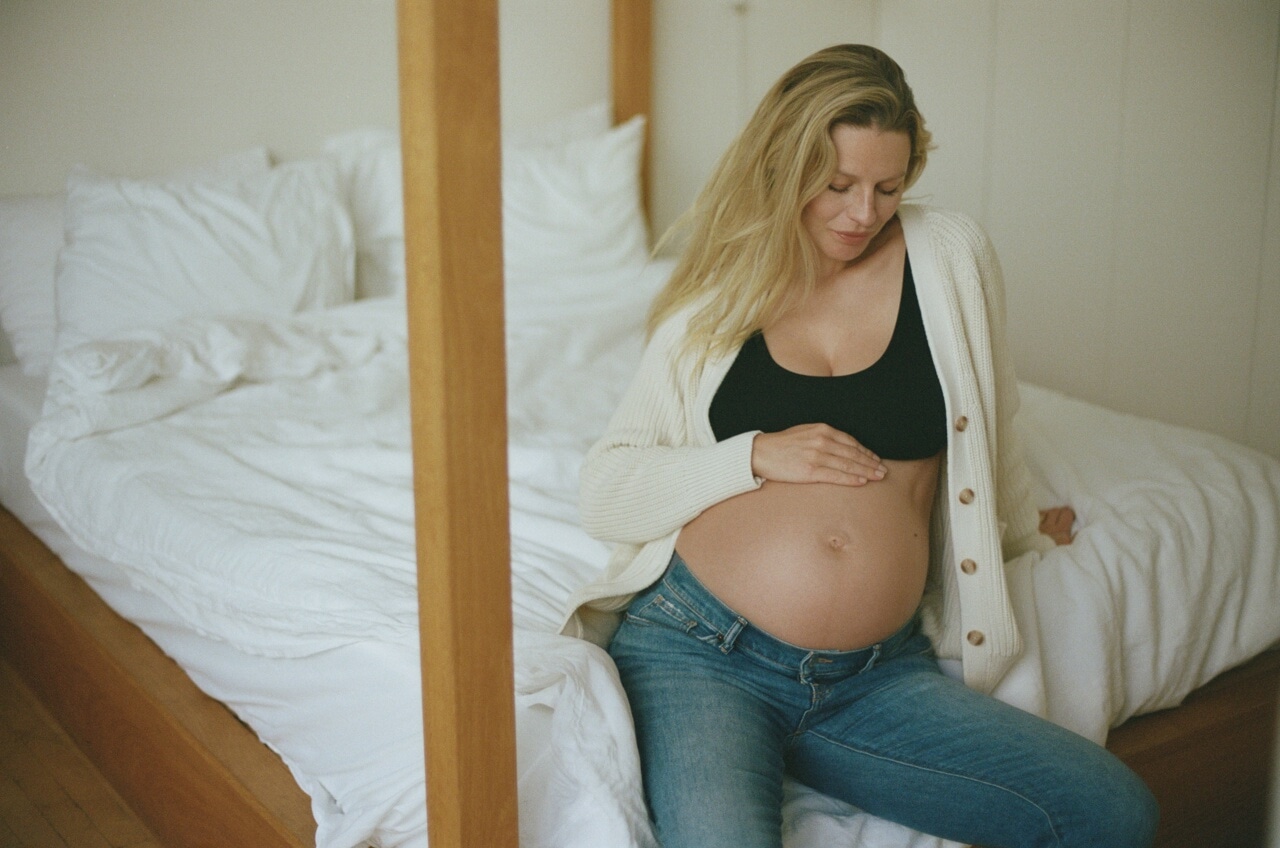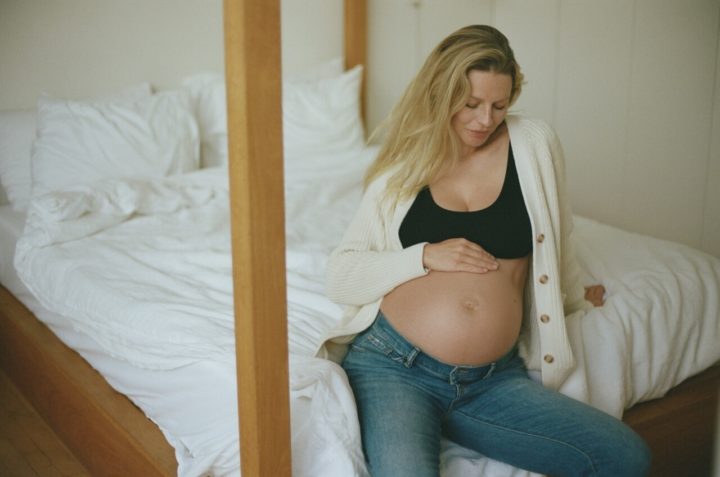It can feel nearly impossible to get a good night’s sleep during pregnancy. Between dealing with back pain, leg cramps, and getting up every 20 minutes to go pee, you might be begging your body for one night of solid shut-eye, especially our third-trimester warriors out there!
Or maybe not: maybe you find yourself on the opposite end of the spectrum, and you can’t seem to stop hitting the snooze button. Excessive sleeping during pregnancy — defined as nine or more hours of uninterrupted sleep per night — affects anywhere from 10-30% of pregnant women, and some think it might not be the best practice.
So what’s the right amount of sleep during pregnancy, and how can we hit that goal? We have the answers to your most burning questions about sleeping during pregnancy below.
How Much Sleep Do I Need While Pregnant?
One of the most special (and most cumbersome) parts of pregnancy is that now, you’re doing everything for two — including sleeping.
Many studies have indicated that pregnant women need more sleep than their non-pregnant counterparts, thanks to a combination of different hormones. Of course, getting a good night’s sleep is important for general health, which is extra important when you’re busy growing a mini human.
Yet you might find that during pregnancy, good sleep is harder to come by than ever. Aside from the usual suspects — morning sickness, frequent urination — a whole host of sleeping problems can develop during pregnancy, causing further disruption to your much-needed shuteye.
If it feels like we’re describing you right now, know that you aren’t alone — one 1998 poll found that up to 78% of women experience disrupted sleep during pregnancy. So don’t worry, mama, you’re not alone. Sleep problems are par for the course during pregnancy.
In general, doctors recommend shooting for seven to nine hours of sleep per night — much less is too little, and any more may be a sign that something else is going on. However, we want to note that everyone is unique and different and will have different sleep needs.
Generally, some people feel their best clocking at least seven hours of snoozing, but if you find that your burgeoning belly (and all the symptoms that come with it) are getting in the way, don’t fret — you’re in the majority.
Why Am I Always Tired?
We all expect to be exhausted once baby arrives, but tired during the first trimester, too? It might seem unfair, but it’s actually totally normal to feel super tired during early pregnancy. Your body is growing another person, after all, and a lot is going on that might contribute to excessive fatigue.
Let’s dig in:
During pregnancy, your hormones are putting in double time — hello, mood swings! Your progesterone levels are increasing, which can cause sleepiness during the day, while at the same time, your oxytocin levels are ramping up at night, which can disturb sleep at night, especially into the second and third trimesters.
Oxytocin is the hormone responsible for uterine cramping. It’s also the same hormone called the “love hormone,” which helps build connections and makes us feel happy. If that isn’t the perfect example of a double-edged sword, we don’t know what is.
Obstructive Sleep Apnea
Hormone changes can even contribute to seemingly unrelated conditions, such as obstructive sleep apnea. Obstructive sleep apnea occurs when the mucus membranes in your nose swell thanks to an increase in estrogen, blocking off your airway and causing you to temporarily and frequently stop breathing — an alarming but common sleep disorder known as sleep apnea.
Obstructive sleep apnea isn’t the only external condition caused by pregnancy. There are a lot of pregnancy-related conditions that contribute to your sleepless nights, even if they aren’t directly making you sleepy.
For example, leg cramps, restless leg syndrome, frequent urination, and even plain old anxiety from thinking about your upcoming delivery can all contribute to disturbing your shuteye.
Fatigue/Overexertion/Everything Else
Another reason for your excessive fatigue during early, mid, or late pregnancy may just be, well, plain old exhaustion. Not only are you carrying around a whole bunch of extra weight (that cute baby bump turns into a back workout real fast!), but pregnancy can wreak havoc on your body, causing conditions that cause fatigue all on their own.
Think about how you feel when you have a cold or when you’re on your period. Dealing off any type of symptom takes energy, and the same thing holds true for pregnancy-related issues, such as prenatal heartburn or gastroesophageal reflux disease (GERD). Both of these disorders are often triggered by pregnancy and can naturally drain your energy, even if you feel that you aren’t actively doing anything to cause fatigue.
So if you feel yourself constantly craving some shuteye, don’t beat yourself up for it — you’re just experiencing a normal, albeit draining, part of pregnancy. It’s one of the many gifts of growing a new little human all by yourself.
How Can I Improve My Sleep?
So what’s a mama-to-be to do about all of this? The first step to improving sleep quality is to talk to your obstetrician or healthcare provider about what you’re experiencing.
They’ll be able to recommend remedies and possibly provide you with medication for more persistent concerns, such as sleep apnea or restless legs syndrome. They’ll also be able to check that nothing more serious is going on.
Sleep Hygiene
Aside from talking to your healthcare provider for medical advice, there are also some steps you can take on your own to ensure you’re getting enough sleep. According to the Mayo Clinic, one of the most important things you can do to improve your sleep pattern during pregnancy is to practice good sleep hygiene.
This means making your room dark and relaxing around bedtime, removing all electronics, if possible, and setting the thermostat to a comfortable, preferably cool, temperature. Regularly practicing relaxation techniques before bedtime can help, as can going to bed and rising at the same time each day.
Pregnancy Pillow
You might also consider investing in a comfortable pregnancy pillow, which can help support your body and ease aches and pains during the night, especially as you transition to sleeping on your side rather than your stomach or back.
Self-Care
Or, create a relaxing nightly ritual for yourself, such as journaling, reading, or taking a soothing shower or bath. Getting into a regular routine and consistent sleep habits can do wonders for helping you sleep through the night.
There might not be much you can do to stop your babe from pushing on your bladder in the middle of the night, but there are definitely some aspects of your sleep during pregnancy that you CAN control.
Talk to your healthcare provider about your concerns, and next time it gets close to bedtime, throw on your comfiest maternity PJs and practice that good sleep hygiene — and watch your sleep troubles melt away!
What if I’m Sleeping Too Much?
While we’re much more likely to experience trouble sleeping than the opposite, some women do experience excessive sleeping during pregnancy.
Your blood pressure naturally dips during sleep and sharply rises again upon awakening. This happens every time we wake — including multiple times per night in women who have trouble sleeping during pregnancy. And although waking up frequently during the night isn’t exactly fun, it turns out that it might be a good thing during pregnancy, thanks to those spikes in blood pressure.
When women experience excessive sleeping during pregnancy, they don’t benefit from the rise in blood pressure and instead experience extended periods of low blood pressure.
If you find yourself consistently sleeping for more than nine hours per night during pregnancy, talk to your obstetrician or healthcare provider. Sleepiness is extremely common in pregnant women, especially as it gets closer and closer to your due date, but regularly sleeping for more than nine hours per night may be a cause for concern.
Bed Dread
Whether you find yourself struggling for enough shuteye or unable to get out of bed, the most important thing is not to guilt or shame yourself for what you’re experiencing. Pregnancy is a beautiful and special time in our lives, but it also can be extremely challenging, and that’s okay.
Reach out to your healthcare provider and support system of friends and family during this time. Know that what you’re experiencing has been experienced by millions of women before. And remember — you got this, mama! We’ll be cheering for you every step of the way.
Sources:









